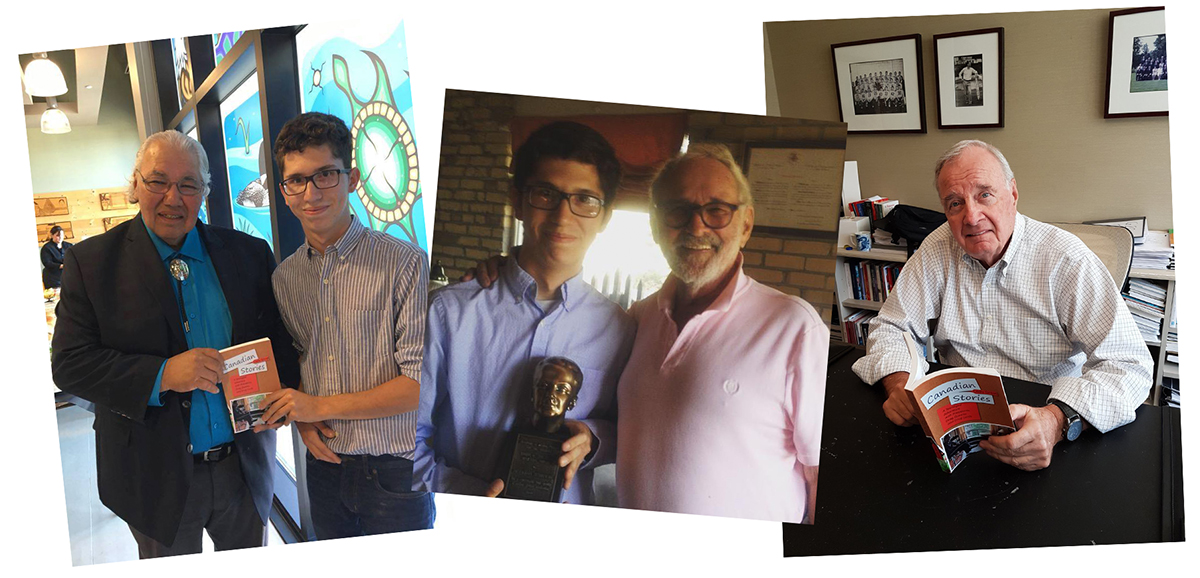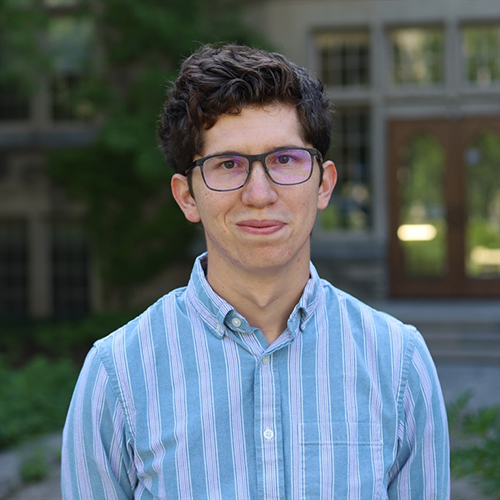Search for academic programs, residence, tours and events and more.
August 5, 2025
Cody Groat’s time at Wilfrid Laurier University is more than just a chapter in his life. The result of his undergraduate years was, quite literally, an entire book.
While studying History and Youth and Children’s Studies at Laurier’s Brantford campus, Groat (BA ’16, PhD ’23) interviewed more than 30 famous Canadians who were later featured in his book titled Canadian Stories. The self-published work includes interviews with actor Dan Aykroyd, former prime minister Kim Campbell, and Michael Stark and Michael Leshner, Canada’s first legally married same-sex couple.

It was a passion project Groat says was encouraged by Laurier Brantford’s “exceptional faculty members,” who would recommend interview subjects and facilitate introductions whenever possible.
“I had a midterm scheduled the day former prime minister Paul Martin said I could come to Montreal for an interview,” says Groat. “My professor said, ‘Go to the interview — that’s more important.’ Laurier Brantford was really accommodating.”
In the years since Canadian Stories was published, Groat’s own story has proved as compelling as any of his subjects.
Immediately after the book’s launch event at Brantford’s Sanderson Centre for the Performing Arts, the newly minted graduate boarded a plane for England, where he’d spend the next year pursuing his master’s. The University of Birmingham’s degree program in World Heritage Studies was developed in collaboration with the UNESCO World Heritage Centre in Paris and struck a chord with the insatiably curious historian.
“I’ve always been fascinated with National Historic Sites of Canada, and my partner and I visited as many as we could in our undergrad,” says Groat. “This program felt like a really relevant fit.”
While presenting his master’s research at his first academic conference in England, Groat found himself on the speaking program alongside his former Laurier Brantford professor, and now good friend, Tarah Brookfield. Catching up over lunch in London, Brookfield posed a question that would set him on a new trajectory — albeit in a familiar setting.
“Why don’t you apply for your PhD at Laurier?”

“I’d had no idea what I wanted to do with my life after my master’s,” admits Groat. “I was this student who had bumbled along first through high school and then my BA. Although I’ve never considered myself academically strong, I like learning and telling stories.”
Although it was past the deadline, Groat took a chance on applying and the return to his alma mater for a PhD was set. In choosing a research subject, he would draw on his interest in storytelling, zeroing in on the federal commemoration of Indigenous Historic Sites. It was a subject that also held personal meaning, as Groat is Mohawk and a band member of Six Nations of the Grand River.
“I wanted to examine how the Government of Canada, by choosing specific people, events and sites as being nationally significant, has cultivated a specific, state-sanctioned narrative of Canada,” says Groat. “I studied how that related to sovereign Indigenous nations, and how Indigenous interpretations of the past differ from the federally imposed interpretations of the past.”
Groat’s academic journey took on a new dimension when he joined the board of directors for the Indigenous Heritage Circle, a not-for-profit organization dedicated to advancing the cultural heritage priorities of First Nations, Inuit and Métis communities. Eventually stepping into the role of president, Groat found himself at the forefront of key policy conversations during a pivotal moment.
“It was really exciting because the period when I engaged with them was just as the United Nations Declaration on the Rights of Indigenous Peoples (UNDRIP) Act was making its way through Parliament,” says Groat. “In my role as president of the Indigenous Heritage Circle, I had the chance to meet with the offices of the Prime Minister, the Minister of Justice and the Minister of Canadian Heritage, as well as the Liberal Indigenous Caucus. We were facilitating conversations about how the UNDRIP Act could impact heritage legislation in Canada.”
Although not all their advocacy efforts yielded immediate results, Groat emphasizes the importance of representation. “We got a seat at that table — and that matters,” he says.
Groat’s time as a PhD student also led to his first university teaching role, stepping in as a sessional instructor at St. Paul’s University College (now United College) at the University of Waterloo. The course on Indigenous Studies provided Groat with an opportunity for a deeply personal teaching moment.
“My dad, Bill, was a Sixties Scoop survivor and a transport truck driver — just an average guy,” says Groat. “I asked him to come speak to my class about his experience as an Indigenous person in the child welfare system. About three minutes into the lecture, he just started bawling his eyes out. He’d never talked about his life before, and it was just a release.”
The experience resonated deeply, and Groat’s father went on to guest lecture several more times, including for Brookfield’s History of Adoption classes at Laurier Brantford.
“He never finished high school and had some literacy issues, but he loved being a ‘university instructor,’ as he called himself,” says Groat. “He wanted to tell his story so others could learn from it.”

For the past four years, Groat has served as an assistant professor at Western University, teaching in the Department of History and the Indigenous Studies program. His approach to teaching — shaped by his time at Laurier — focuses on connection, accessibility and trust.
“At Laurier Brantford, we always called our professors by their first names. It was a casual, close-knit environment that broke down the usual academic barriers,” says Groat. “Now, at Western, I ask my students to call me Cody. Some find it strange, but it changes the dynamic. If students feel comfortable, they’re more engaged. Academia can be a very snooty thing, and I don’t think it needs to be.”
Despite the larger scale of Western, Groat works hard to bring those Laurier Brantford-style values into his own classrooms.
“I try to build one-on-one relationships with students, even if it’s harder in a big institution,” he says. “It’s something I believe needs to be done.”
As for what’s next, Groat is preparing to publish his PhD dissertation, Always a Part of the Land: The Federal Commemoration of Indigenous Histories, with McGill-Queen’s University Press, slated for release in early 2026. He’s also tackling a new research project funded by the Social Sciences and Humanities Research Council that melds a personal journey with a familiar passion — storytelling.

“At Western, I ask my students to call me Cody. Some find it strange, but it changes the dynamic. Academia can be a very snooty thing, and I don’t think it needs to be.”
Cody Groat
“The Haudenosaunee Confederacy and some other nations have a teaching where you have to consider the impact of your decisions on seven generations that come after you,” he says. “That’s one of the teachings embedded in our Great Law of Peace.”
Groat’s research for his new project is rooted in his own family history, drawing on archival records dating back seven generations to the time of the American Revolution, when the Haudenosaunee Confederacy relocated from its territories in present-day New York State to what is now Six Nations of the Grand River.
“It ends with my dad,” says Groat. “He was the seventh generation, and he passed away on May 22, 2022.”
Groat’s father spent his later years reconnecting with his identity.
“At the end of his life, he was discovering who he was and was quite comfortable with who he was — finally, as a Haudenosaunee citizen, as a Mohawk citizen,” says Groat. “I think that he really ended up in a positive place in his life, even though he faced personal challenges, including alcoholism, ultimately achieving over 30 years of sobriety and helping others along the way.”
Groat’s work will explore his father’s story through the seven-generation framework, examining broader themes of intergenerational trauma, Indigenous masculinities and the long-term effects of colonial policies including residential schools and the Sixties Scoop.
“That’s what I’m working on now,” he says. “The story of my dad.”